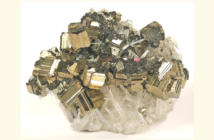Lead-acid batteries comprise lead plates between which ions exchange through a sulfuric acid solution. Manufacturers add pure distilled water to obtain a 37% concentration level. This amounts to approximately one part of acid to two parts water. In reality, they also include chemical attitudes such as calcium to tweak battery performance. If they used tap water instead of distilled water, this would upset the chemical balance.
The Difference Between Vented and Sealed Lead Batteries

Early lead battery types gave off heat while generating electrical energy. This caused the electrolyte to expand by volume, and exert pressure inside the battery case. Scientists designed venting holes so the water in the sulfuric acid solution could evaporate through them.
But there was a down side. Because the water loss upset the electrochemical balance, and degraded the performance of the battery. Battery owners now had to replace the water regularly to extend their battery’s life.
Modern lead-acid batteries contain their sulfuric acid solution in a ‘sponge’, which largely prevents these problems occurring. We call these batteries sealed batteries because they do not need vents, and thus last longer. All our lead batteries are the sealed variety. You need never worry about ‘topping them up’ with distilled water ever.
We Should Never Top Up Starter Batteries with Tap Water

Sealed battery technology is relatively expensive. Auto starter batteries without ‘long life’ labels are typically vented ones. They are cheaper, but they are high maintenance because the water in their diluted sulfuric acid needs replenishing. We recommend using pure distilled water to do so.
Pure distilled water costs a little more, because distillation removes impurities. Utility tap water has various chemical additives to prevent biological contamination, and keep it looking crystal clear. If we use municipal water to top up vented lead acid batteries, these additives leave a deposit on the lead plates.
This layer impedes the flow of ions, and the generation of electrical energy. As a result, batteries topped up with council water fail sooner. Topping up vented lead batteries with slightly cheaper tap water is therefore bad for the batteries, and a false economy.
Related
How Auto Lead Acid Batteries Work
The Sulfuric Acid in Sealed Batteries
Preview Image: Fork Lift Batteries




